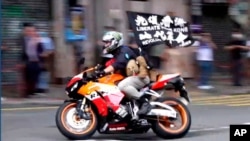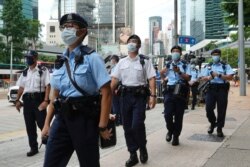When Hong Kong’s national security law was about to be implemented 13 months ago, the city’s chief executive, Carrie Lam, said the legislation would only target a small minority. Government authorities began playing down fears about the security law, despite concerns of many in the city over the law’s ambiguity.
Even media mogul Jimmy Lai said at the time, “We just relax and see what happens.” Lai now is serving two prison sentences and is awaiting trial on charges of foreign collusion, one of the key offenses outlined under the security law.
Hong Kong has seen at least 117 people arrested and at least 60 charged since the law came into force. The first court verdict came this week.
After a 15-day trial presided over by specially selected judges and no jury, former waiter Leon Tong Ying-kit, 24, was found guilty of secession and terrorism under the security law. During a protest on July 1 last year, the first full day the security law was in force, the court panel found Tong was guilty of driving a motorcycle into police officers while carrying a flag that incited secession. The anti-government protester was sentenced to nine years in prison Friday afternoon.
With Hong Kong’s population of 7.5 million, chief executive Lam’s minority claim is technically true. Yet the law's far-reaching effects have many in the city concerned.
“Law is supposed to guide people’s actions. But from last July until now, we’ve really all been guessing where the red line was,” one Hong Kong-based lawyer told VOA.
The lawyer, who chose to stay anonymous for her own protection, has represented defendants charged under the security law. She predicted that if Beijing went to the trouble to enact the law upon Hong Kong, it would have an impact.
“We already had some inkling of how far-reaching it would be, then we already knew it would not affect only a small minority of the Hong Kong people. At the time because we didn’t know the substantiveness, our main concerns were with the procedure.”
“Afterwards when we did see, it was so vague and so far-reaching. It’s so wide and you don’t know when you fall foul of it until you get arrested,” she said.
Last week five members of the General Union of Hong Kong Speech Therapists were arrested for allegedly “conspiring to publish seditious materials” after they published a selection of children’s books. Authorities claim the books that revolve around sheep incite hatred toward the government. Two of the members have since been denied bail.
This incident follows the arrest of a 40-year-old man after his laundry drying rack was spotted holding a flag bearing the same slogan as Tong’s flag: “Liberate Hong Kong, Revolution of Our Times.” The incident has increased fears about how certain phrases can be interpreted as sedition in the city.
Although Tong’s sentencing on Friday may set the tone for future national security law trials, with dozens yet to begin, activists in the city are still filled with uncertainty.
Wong Yat-Chin, 20, is a pro-democracy activist and co-convener of the political group, StudentPoliticism. Even though dozens of his fellow activists are in jail, he has been regularly leading street booth events, set up to interact with the Hong Kong people, and remind them of the democracy movement.
His efforts have seen him arrested a couple of times of late, including on June 4, during Hong Kong’s banned Tiananmen Square vigil.
Wong does not know if he’s violated the law.
“I believe that no one person or political party in Hong Kong can clearly know where the red line of the National Security Law is. Perhaps only CCP can clearly know,” he added, referring to the Chinese Communist Party.
The 20-year-old recently publicized a new tattoo on his arm, that he said means "the body and the land will not be separated" and is in support of democracy in Hong Kong. Given the arrests for sensitive slogans in the city, the Hong Kong-based lawyer was unsure if tattoos would be construed as sedition.
“That’s a good question,” she said.
Hong Kong’s media have also come under severe pressure under the security law, epitomized by the closure of pro-democracy newspaper Apple Daily.
Founded by Lai in 1995, last month the media outlet saw several of its executives arrested for alleged foreign collusion.
Authorities said more than 30 Apple Daily articles are evidence that the media outlet was calling for foreign sanctions on Hong Kong and China. Authorities then froze company finances, forcing it to close. More recently, another former editor for the pro-democracy newspaper was arrested.
Stand News, a pro-democracy news website in Hong Kong, recently removed online content of commentaries and blogs, a move seen to reduce sensitive material that could be used against them.
In addition, more than 200 elected district councilors across 18 Hong Kong districts recently quit their posts following a recently implemented oath-taking law that targets “unpatriotic” civil servants.
During the anti-government protests in 2019, the District Council elections saw a landslide victory for the pro-democracy opposition that was seen as an unofficial referendum as nearly 3 million people voted.
One former district councilor has fled to Britain in self-exile.
Nigel Kawai Lee told VOA he was disqualified from his position because he refused to swear an oath to Hong Kong and authorities feared he would say something out of turn.
“Nobody really knows where the red line is. And that’s what makes all the politicians so scared.







